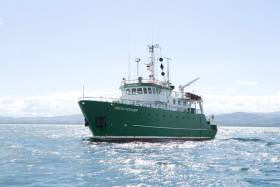Displaying items by tag: Ocean Sampling Day
Scientists and students at NUI Galway’s Ryan Institute enjoyed a day trip on the Marine Institute’s research vessel RV Celtic Voyager on Friday (21 June) to take part in Ocean Sampling Day 2019.
Ocean Sampling Day is a simultaneous sampling campaign of the world’s oceans by scientists globally. It is organised by an EU consortium of marine research institutes, known as ASSEMBLE Plus, of which NUI Galway’s Ryan Institute is a partner.
Chief scientist Prof Louise Allcock, who is director of the Centre for Ocean Research and Exploration within the Ryan Institute, led a team of four experienced scientists and 11 marine science undergraduates who are in the first to third year of their studies.
Prof Allcock said: “We will sample and filter water from the ocean, and our filter papers, as well as those from other sites around the world, which will be sent to a molecular lab in a marine station in Greece where all the DNA on the filter papers will be sequenced to give an estimate of what bacterial and invertebrate species are present in the ocean.
“A healthy ocean has a wide variety of species, an unhealthy ocean less so — and hence we get an overview of our ocean health."
Sheena Fennell, one of the experienced scientists in the team who has spent extensive time at sea, explained the benefits to the undergraduate students joining the expedition.
“The students learn in their lectures all about the water column, the bacteria and invertebrates living therein, and the specialised gears that we use to sample, but this is an opportunity for them to get genuine hands-on experience while contributing to an international research project.”
The science team sampled directly above the SmartBay SubSea Cabled Observatory in Galway Bay.
Prof Allcock spoke of the importance of this site to the project: “The SmartBay Observatory provides subsea data all year round which means there is an enormous environmental dataset to complement our physical samples.
“Taking our samples from here also affords us the opportunity to highlight this impressive infrastructure to our European colleagues.”
The Marine Institute is also entertaining a group of third-level students as part of the 2019 Summer Bursary Programme.
Coming from a variety of disciplines across seven academic institutions, the students will gain experience in various fields of marine science including marine fisheries, aquaculture, communications, archiving, ecology, chemistry and catchment research in placements running between eight and 12 weeks.
“The work experience programme enables students from a wide variety of disciplines to further their knowledge and research in their particular area of interest,” said Helen McCormick, programme co-ordinator and senior laboratory analyst at the Marine Institute.
“It also offers students the opportunity to expand their professional networks, by meeting fellow students from other universities as well as work with experts in the their field and across the marine sector.
"Previous bursars have gained various positions within the Marine Institute at all grades up to and including director level.”
While many of the bursars will be based in the laboratories and offices at the Marine Institute’s headquarters in Oranmore, some students are also stationed at the catchment research facility in Newport, Co Mayo, where they will work with salmonids and eels, while others will be based in Castletownbere, Co Cork sampling fish and shellfish catches.
A number also took part in SeaFest 2019, Ireland’s national maritime festival, which took place from 7-9 June in Cork.





























































